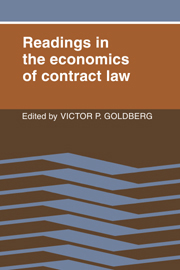Book contents
- Frontmatter
- Contents
- Preface
- Readings in the economics of contract law
- Part I Some preliminaries
- 1.1 Non-contractual relations in business: a preliminary study
- 1.2 Relational exchange: economics and complex contracts
- 1.3 Production functions, transactions costs, and the new institutionalism
- 1.4 The market for “lemons”: quality uncertainty and the market mechanism
- 1.5 A treatise on the law of marine insurance and general average, volume I
- 1.6 The economics of moral hazard: comment
- 1.7 The economics of moral hazard: further comment
- 1.8 Efficient rent seeking
- Questions and notes on rent seeking
- Part II Contract law and the least cost avoider
- Part III The expectation interest, the reliance interest, and consequential damages
- Part IV The lost-volume seller puzzle
- Part V Specific performance and the cost of completion
- Part VI Power, governance, and the penalty clause puzzle
- Part VII Standard forms and warranties
- Part VIII Duress, preexisting duty, and good faith modification
- Part IX Impossibility, related doctrines, and price adjustment
- Questions and notes on impossibility and price adjustment
- References
- Index of cases
- Author index
- Subject index
1.3 - Production functions, transactions costs, and the new institutionalism
Published online by Cambridge University Press: 10 November 2010
- Frontmatter
- Contents
- Preface
- Readings in the economics of contract law
- Part I Some preliminaries
- 1.1 Non-contractual relations in business: a preliminary study
- 1.2 Relational exchange: economics and complex contracts
- 1.3 Production functions, transactions costs, and the new institutionalism
- 1.4 The market for “lemons”: quality uncertainty and the market mechanism
- 1.5 A treatise on the law of marine insurance and general average, volume I
- 1.6 The economics of moral hazard: comment
- 1.7 The economics of moral hazard: further comment
- 1.8 Efficient rent seeking
- Questions and notes on rent seeking
- Part II Contract law and the least cost avoider
- Part III The expectation interest, the reliance interest, and consequential damages
- Part IV The lost-volume seller puzzle
- Part V Specific performance and the cost of completion
- Part VI Power, governance, and the penalty clause puzzle
- Part VII Standard forms and warranties
- Part VIII Duress, preexisting duty, and good faith modification
- Part IX Impossibility, related doctrines, and price adjustment
- Questions and notes on impossibility and price adjustment
- References
- Index of cases
- Author index
- Subject index
Summary
My hostility to [the phrase] transactions costs must strike most readers as odd, since the “new institutional economics” and “transactions costs economics” are often thought of as synonymous. My concern in this instance is perhaps more semantic than substantive. It does seem to me, however, that “transactions costs” runs the risk of becoming the “imperfect capital markets” of the 1980s, the all-purpose answer that tells us nothing.
A bit of history. In his early paper on “The Nature of the Firm,” Coase [1937], in effect, said: If markets work as well as they do in our models, then no alternative system could do better, and most would probably do worse; why then, he asked, would anything but impersonal markets emerge and thrive? Since firms do exist and do thrive, we must ask how such organizations could be superior to the impersonal markets. The answer – or really the first part of the answer – was that impersonal markets weren't so darn perfect anyway; their imperfection he called “transactions costs.” Two decades later, Coase [1960] conducted the same sort of exercise with externalities. Economists were classifying goods in two categories: for normal goods (with zero transactions costs) markets worked perfectly; for externalities (with infinite transactions costs) markets worked not at all. Coase never bothered to give a precise definition of transactions costs because he didn't take the concept very seriously. It was only the name of whatever it was the economists had been ignoring; the intent in both papers was to move analysis away from a world in which market perfection was an all-or-nothing affair.
- Type
- Chapter
- Information
- Readings in the Economics of Contract Law , pp. 21 - 23Publisher: Cambridge University PressPrint publication year: 1982
- 1
- Cited by



